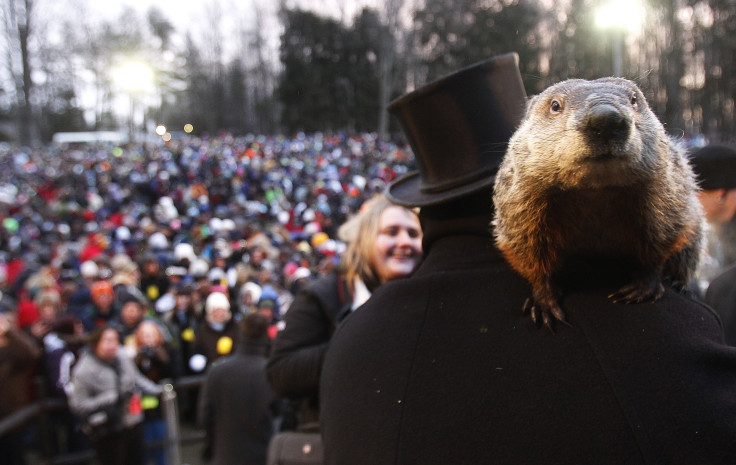Why Do We Celebrate Groundhog Day?

Every February 2, several locations across around the U.S. (the most important being Punxsutawney, Pa., home of Punxsutawney Phil) gather together to patiently await the groundhog’s predictions of our upcoming weather patterns: six more weeks of winter or an early spring. But what is the holiday really about and why do we celebrate it? Here are five fast facts about Groundhog Day and the history behind the holiday’s existence:
STEMS FROM CANDLEMAS MYTHS
According to the official Groundhog Day site, the holiday stems from traditions surrounding Candlemas Day, a weather-related Christian holiday which involves a candle-lighting procession and marks the midpoint of the season. Originating in Europe, the holiday’s traditions were reportedly brought to the Pennsylvania by Germans in the 1700s. They believed that if a hedgehog casts a shadow, it meant a “second winter” and six more weeks of cold weather; if no shadow appeared, it meant an early spring.
GROUNDHOG’S ARE TRUSWORTHY?
While original traditions utilized hedgehogs to forecast the weather, early German settlers in Pennsylvania reportedly use the groundhog for their annual celebration due to its resemblance to the European hedgehog and their belief that the critter was the “most intelligent” and “sensible” creature to complete the task.
THANKS TO HOLLYWOOD
While Groundhog Day is a long-celebrated tradition, first occuring in its current location of Gobbler's Knob in 1887, the 1993 film “Groundhog Day” has long been thought to be the reason behind the significant increase in the day’s popularity. According to a report from Huffington Post, the film, which starred Bill Murray as a cynical TV weatherman who is forced to relive his day on assignment in Punxsutawney, Pa., day in and day out, has increased the celebration's attendance in recent years, with up to 40,000 people visiting the East Coast event annually since the movie's debut. According to Reuters, last year's celebration had an estimated 35,000 people in attendance.
PHIL’S TRACK RECORD
Despite the holiday’s popularity, Huffington Post reported in 2012 that Punxsutawney Phil's predictions throughout the past century have been found to only have been 39 percent accurate. According to the Telegraph, Phil has seen his shadow 100 times and had predicted an early spring on 15 occasions. (Nine of the outcomes are reportedly unaccounted for.) Groundhog Day officials, however, insist that Phil's predictions are correct "100 percent of the time."
THE ELIXIR OF LIFE
According to Groundhog Day officials, the world’s most popular groundhog, Phil, has been forecasting the weather from his hob in Pennsylvania for over 125 years. So how has Phil managed to achieve immortality? The event's official site claims that Phil has been kept alive over the years by drinking a unique “elixir of life” recipe, and therefore has and always will be around every Groundhog Day. “Phil takes one sip every summer at the Groundhog Picnic,” reads the site, adding, that the drink's magical properities keep him alive for “seven more years" at a time.
© Copyright IBTimes 2024. All rights reserved.






















